Randy Alcorn's Blog, page 156
December 7, 2015
Still Wrestling with the Syrian Refugee Issue

People have been discussing this issue for weeks, generating a lot more heat than light. Angry and dismissive responses to others’ positions have been routine. I think it’s worth continuing the discussion, since even after this particular issue passes, a host of similar ones await us.
Earlier I linked on my Facebook page to a Desiring God article, “Eight words from Jesus in a world of Refugees.” Last week I posted a video from Dan Franklin with some further thoughts. In response, a reader sent me a link to a video from Todd Wagner, pastor at Watermark Community Church in Dallas, Texas. Before I take you to Todd’s video, which provides some balance to what I’ve cited earlier, I want to make some comments.
First, I know and deeply respect both Dan and Todd, two evangelical pastors who are in agreement about the inspiration of Scripture, the lordship of Christ and all the central doctrines of the Christian faith, even if they may lean different ways in how to approach this crisis. Dan Franklin's video does a great job addressing the problematic tone of the arguments about this among believers. Christians should certainly be able to understand and empathize with their brothers and sisters who take a different position on this, because it’s not an easy issue. From the tone he takes in his video, it’s apparent that Todd shares that same concern.
There’s a lot I’m not sure of related to this issue. But I am sure that the rush to judgment and hostility and name-calling among Christ-followers is displeasing to God (and certainly not limited to this one issue).
“If one gives an answer before he hears, it is his folly and shame” (Proverbs 18:13). A lot of people are clearly not listening to each other. The truth is, Bible verses can be cited to make opposite points. And if you listen to just one side, you’ll likely mindlessly accept it and parrot it: “The one who states his case first seems right, until the other comes and examines him” (Proverbs 18:17).
I don’t appreciate, on the one hand, the purely fear-driven approach to this issue that says, “All these refugees would kill us if we let them in!” On the other hand, I also don’t appreciate the idealistic but unrealistic approach that says, “We should let anyone and everyone into this country.” (Since if we actually did that, we would cease to be “this country” that has so much to offer the world).
The church and America are not the same. Nonetheless, historically America’s identity has had spiritual qualities, including “E Pluribus Unum” (“from many, one,” embracing both diversity and unity). This welcoming of the needy has always been a part of our country. As Emma Lazarus wrote, cited on the Statue of Liberty,
Give me your tired, your poor,
Your huddled masses yearning to breathe free,
The wretched refuse of your teeming shore.
Send these, the homeless, tempest-tossed, to me:
I lift my lamp beside the golden door.
If we are unwilling to take any risks whatsoever, the USA should just take down the Statue of Liberty and stop all immigration and accept no new citizens, and change our slogan to “Just Say No to Compassion.” On the other hand, if we are unwilling to do everything possible to establish a vetting process by which we evaluate and deny entry to those refugees/immigrants who are likely to despise our country and inflict violence on our citizens, we should change our slogan to, “Just Say No to Wisdom.”
The slogan on the Statue of Liberty has never meant that U.S. borders are open to anyone no matter what. There has always been some care taken in terms of who is allowed into the country and who isn’t. Yet, there has also been a willingness to take a measured risk of admitting people who might prove to make a valuable contribution and become loyal citizens, but might also prove to become a burden or even a threat.
We can’t be omniscient, but God calls us to both compassion and wisdom. Not all compassion involves opening our borders to all needy people—it can also involve helping them settle in other nations. Here’s an example of the biblical call to measure danger and take it into consideration in how we respond: “The prudent see danger and take refuge, but the simple keep going and pay the penalty” (Proverbs 22:3, NIV).
Yet wisdom as a value also doesn’t stand on its own—that same book of Proverbs, the greatest source of wisdom in all Scripture, says “Whoever is generous to the poor lends to the LORD, and he will repay him for his deed” (Proverbs 19:17, ESV). It also says “Those who give to the poor will lack nothing, but those who close their eyes to them receive many curses” (Proverbs 28:17). Hence, what is compassionate is also ultimately wise, because God rewards it.
Lest we think these passages only relate to giving money, the “poor” and needy aren’t just the underfinanced. There are Old Testament themes of caring for those lacking freedom and safety (Isaiah 58:6-7). Peaceful foreigners living among God’s people were to be welcomed and embraced (Leviticus 19:34). “Do not mistreat or oppress a foreigner, for you were foreigners in Egypt” (Exodus 22:21). On the other hand, sanctuary and subsidy wasn’t offered to known enemies of the state.
As Christians we are to love and pray for our enemies (Matthew 5:44), but that doesn’t mean we are called to enable people to inflict harm on our nation, churches and families. Indeed, since those who harm others will be condemned for doing so, enabling people to do harm is not loving them.
Compassion without thought and discernment has predictably bad consequences: “A prudent person foresees danger and takes precautions. The simpleton goes blindly on and suffers the consequences” (Proverbs 27:12, NLT, which repeats the earlier cited 22:3).
There’s nothing simple about being true to all these principles and passages. We must simultaneously embrace biblical teachings that stretch us to our limits in trying to achieve a balance that’s both loving and reasonable.
If we label others who disagree with us as “bleeding-heart liberals who want to sacrifice our national security” or “heartless conservatives who don’t believe in Christ’s love for the needy” then we are, ironically, guilty of lacking both compassion and wisdom not only toward the refugees, but each other.
We should act in compassion and wisdom, not one without the other. The trick is, how do we do both at once in this particular situation? While the large principles of compassion and wisdom are clear, I confess that I’m torn on the practical implications of how to balance them. It’s worth thinking and praying about because other situations have and will call upon us to figure out how to be compassionate and wise at the same time—with a compassion that doesn’t nullify wisdom, and a wisdom that doesn’t nullify compassion.
In the video below, Todd Wagner speaks of the need for vetting potential immigrants, which of course can never be 100% effective, and therefore still involves risk. But it’s a measured risk rather than a reckless one. If we are determined to eliminate all risk, we will inevitably fail to love those in dire need and collapse into the black hole of self-insulation. Reasonable steps to insure safety are one thing; isolation from the world and the needy is another.
Todd points out that our role as Christ-followers is not always the same as our country’s. My conviction is that God often calls the church, His people, to risk our lives by going to help the needy in the most volatile situations. But that doesn’t mean it’s our country’s job to take the same level of risk that missionaries have taken throughout church history. The USA’s first responsibility is to protect its citizens and provide for their safety. (This doesn’t mean taking no risks, but often will mean taking fewer risks than Christians, churches and missions organizations.) Our government’s role is different than, but isn’t inherently contradictory to, the church’s responsibility to call upon its people to take great risks for the cause of Christ.
Listen to what Todd has to say in this twelve-minute video. You don’t need to agree with all of it to realize it contains valuable insights.
December 4, 2015
A Pro-Life Response to the Colorado Planned Parenthood Shooting: All Human Lives, Both Born and Unborn, Matter

My heart goes out to the families of the three victims who died in last Friday’s shooting at the Planned Parenthood facility in Colorado Springs. I was especially touched to read about the courage of 44-year-old Garrett Swasey, the police officer who died in the line of duty. Swasey was also a co-pastor at his church and had pro-life convictions.
Because of the location of the shooting, and because shooter Robert Lewis Dear supposedly said something about “No more baby body parts” after he was apprehended, there’s been much conjecture, and outright statements, in the media and the public square about Dear’s motives and his connection to the pro-life cause.
Trevin Wax writes:
My pro-choice friends pin the blame of last week’s attack on the renewed wave of activism in light of the recent Planned Parenthood videos. That is a simplistic and unprovable assumption, one that is directly countered by the example of the selfless officer who, while deploring the abortion industry, raced inside to rescue its employees.
The most effective way for abortion clinics to gain public sympathy and damage the reputation of prolifers is to portray themselves as the victims of prolife violence. But the horrific—and rare—actions of those like Dear do not discredit the peaceful efforts of 99.99 percent of prolifers. To blame the prolife movement for such isolated events is like discrediting the antislavery movement because some zealous abolitionists burned the crops of slave owners or like blaming all prochoice people for the personal threats received by some prolife advocates. It’s worth pointing out that the pro-life movement has been considerably less violent than the civil rights movement, yet most people immediately see the illegitimacy of trying to discredit that movement because of the violence of some.
It seems the real issue for pro-choice advocates is that by simply stating the fact that abortion kills human beings, all pro-lifers are considered extreme and inflammatory. As Ramesh Ponnuru points out:
Pro-choicers who want pro-lifers to stop saying that abortion kills unborn children aren't objecting to the pro-life movement's rhetoric; they're objecting to its existence.
The irony in the prochoice response to this tragedy is that it’s only the pro-life position that’s against all violence done to all people at abortion clinics. In contrast, the prochoice position is against violence only to those who have the advantage of already having been born. Those who are young and small and defenseless and dependent enough are allowed to legally be killed. So while we should rightly mourn and decry the deaths of those killed in the shooting, we also shouldn’t forget the countless unborn children who have lost their lives to abortion. In a consistent pro-life worldview, all human lives matter.
As I shared after the 2009 killing of abortionist George Tiller, my concern with an event like this is that people will say, we can’t speak out in favor of saving unborn children, because then we’re going to be encouraging the killing of abortionists. Tim Braham develops the danger of this thinking in his article “Why Pro-Life Advocates Are Not Responsible for the Planned Parenthood Shooting”:
If a non-violent statement becomes transformed into a violent statement the second a crazy person shoots someone and mentions you, the world would be an absurd place. It would be a world where literally any statement can be a violence-inciting statement; you just need a mentally ill person to act violently and then blame you for it. This would be a world where we cannot condemn any kind of evil or injustice because any statement condemning anything could make us culpable for a murder if we stated our opinion openly and a crazy person happened to be present. As David French said, “To clamp down on speech (or even self-censor) for fear of bitter hermits and angry lunatics is absurd.”
The rest of Tim’s article is quite long, but for those interested it has some great insights.
December 2, 2015
The Refugee Question, and How We’re Talking About It

Thanks, Dan Franklin, for your excellent insights not only on the Syrian refugees, but also on the tone of the debate among believers. God, help us to be compassionate, understanding, reasonable, wise and biblical all at the same time. There are important points made on all sides of the issue, and while it's okay to have strong opinions, it's not okay to be dismissive and superior and fail to understand why there are good people who think differently than we do. This Christmas season, let's join in our gratitude to God for all He has given us in Christ and as a nation, and recognize that to whom much is given, much will be expected.
Here's a brief (probably not brief enough) video with both my take on the refugee question and also my take on how we are talking about the refugee question.
Posted by Dan Franklin on Tuesday, November 24, 2015
November 30, 2015
I’ll [Not] Have a Blue Christmas: Reasons to Rejoice and Be Happy This Christmas

All of us, for better or for worse, experience the holidays each year. From mid-November to early January, our lives change, bringing many delightful things, but also stress and fatigue. Family tensions (whose house do we go to when?), never-ending to-do lists, financial difficulties, unrealistic expectations—reasons for unhappiness abound.
Is it possible to find genuine happiness during the Christmas season, even in the midst of the pressures? Yes. True happiness—the kind Jesus offers—is at the heart of what Christmas is all about!
Consider the angel’s message to the shepherds at Jesus’ birth: “I bring you good news of great joy that will be for all the people” (Luke 2:10). The Greek adjective translated “great” here is megas—this isn’t just news, but good news of “mega-joy.” It’s the best news there has ever been or ever will be.
What characterizes this good news is deep, everlasting joy for those who receive it. The Contemporary English Version renders the verse this way: “good news for you, which will make everyone happy.”
Isaiah 52:7 says, “How beautiful upon the mountains are the feet of him who brings good news, who publishes peace, who brings good news of happiness” (ESV). Here God tells us directly that our mission is bringing everyone the “good news of happiness” about Jesus. .
If the message we share and model at Christmastime and all year long doesn’t include happiness, then it contradicts God’s direct words in Isaiah 52:7. The gospel offers an exchange of misery-generating sin for happiness-giving righteousness provided by Jesus himself—joy incarnate, happiness in human flesh. The gospel is happy-making!
Each stanza of “O Come All Ye faithful” contains sentiments of true happiness: “joyful and triumphant,” “sing in exultation,” “born this happy morning.” Joy, exultation, and happiness are proper responses to Jesus. A gospel not characterized by overwhelming gladness isn’t the gospel. A Christmas without a deep, God-given happiness isn’t reflecting the good news of Jesus.
So how do we experience true happiness during this season? It starts with a godly perspective, a right way of looking at life.
An Eternal Perspective
A reconciled relationship with God, coupled with an understanding of the biblical teaching of a resurrected Heaven and Earth, assures us utter happiness will be ours forever. This happiness will be fully realized in the promised culmination of God’s redemptive plan, in the New Heaven and New Earth.
For various reasons, Christmas can be a difficult season for many people. Yet God comforts his people in suffering, saying, “Look, I am ready to create new heavens and a new earth!” (Isaiah 65:17, NET). What should be our response to this promise? God uses joy-drenched words to describe this New Earth, a place where his people will bring happiness not only to each other but also to him:
Be happy and rejoice forevermore over what I am about to create! For look, I am ready to create Jerusalem to be a source of joy, and her people to be a source of happiness. Jerusalem will bring me joy, and my people will bring me happiness. The sound of weeping or cries of sorrow will never be heard in her again. Isaiah 65:18-19, NET
The forever that awaits us should color our lives now. We should daily frontload eternity’s joys into our present experience by focusing on Christ and anticipating the Heaven that awaits us.
Right Expectations about Life and Suffering
This same eternal perspective will help us adjust our expectations about life under the Curse, especially during the holidays. A biblical worldview is supremely optimistic and joyful, but it also recognizes the present reality of a fallen world.
By lowering our expectations that all should go our way presently, and raising our expectations of eternal life, we can experience true happiness now. Considering the judgment we deserve, every happiness, small or large, is an undeserved gift—the grace of God. When we experience happiness now, we’re grateful; when we don’t, we know someday our happiness will be complete and never-ending.
God doesn’t say we’ll never have hardship or suffering—he specifically promises we will (John 16:33). We’re not to be surprised when we face difficulties, even around Christmastime. Whether it’s something as insignificant as a burnt turkey or as overwhelming as the loss of a loved one, God tells us: “Beloved, do not be surprised at the fiery trial when it comes upon you to test you, as though something strange were happening to you” (1 Peter 4:12). If we expect God to make our lives easy, our expectations are unbiblical.
As Christians, we’ll be delivered from eternal suffering. Even now, God will give us happy foretastes of living in his presence where there is fullness of joy and pleasures forevermore (Psalm 16:11). That’s his promise. And what better time to focus on living in his presence than Christmastime?
Our outlook is changed when we remember that our afflictions are Father-filtered by the God who knows all, governs all, and sovereignly weaves all together for our good: “We know that for those who love God all things work together for good, for those who are called according to his purpose” (Romans 8:28).
The more we grow in our understanding of God’s sovereign grace and loyal love, the happier we become. We don’t have an all-powerful God who doesn’t care; neither do we have a caring God who is powerless to make good things happen. We serve a Creator who loves us and is sovereign over the universe, including all evil.
Our circumstances do matter. Broken relationships can be felt more deeply at Christmastime. Expectations about gifts received or given can bring anxiety. Comparing how others celebrate Christmas can bring sadness, especially if we feel left out. But all circumstances are opportunities for growth and our ultimate good. When they threaten to overwhelm us, these difficulties remind us to look to our Rock and Redeemer (Psalm 19:14). Truly, “the joy of the Lord is your strength” (Nehemiah 8:10).
This is also an encouraging message for those who feel lonely around the holidays, and wish their lives weren’t less busy, but more. Even if not many friends and loved ones are nearby, Christ promises he will be with people always (Matthew 28:20), and will never leave or forsake us (Hebrews 13:5).
Acting on the Right Perspective
We can control our thoughts and attitudes. They’re not foreign invaders against which we are helpless.
Paul said, “Fix your thoughts on what is true. . . . Think about things that are excellent and worthy of praise” (Philippians 4:8, NLT). This doesn’t happen automatically. But once we develop the habit and experience its rewards, we instinctively turn our minds to what makes us happy in Christ.
Of course, we should never flippantly say, “Happiness is a choice.” It’s not always easy to choose happiness in Christ. Embracing happiness is not merely working harder to pull up our minds and moods, as we would our bootstraps. Rather, it’s gratefully receiving God’s grace and happiness.
God provides everything we need to be happy, and empowers us through his Spirit to believe in him and obey. At the same time, he leaves it to us to adopt a right perspective and make the choices that result in happiness. God empowers us through his Spirit to believe in him and obey him. He also calls upon us to genuinely cooperate with him, which requires our effort as we draw on his strength and grace (Philippians 2:12-13).
Happiness from Gratitude Coupled with Humble Service
When life is viewed with a spirit of thankfulness, we’ll see the reasons for happiness that surround us. God gives us hundreds of reasons to be grateful every hour—ask him to open your eyes to them, especially during what should be a joyful season of celebrating Christ’s birth! Developing the discipline of gratitude brings greater praise to God and greater happiness for ourselves. When life’s tough, we can still be grateful that God is with us and that he’s using it for our good.
No matter your circumstances this Christmas, there’s happiness to be found in being grateful for God’s provision, and seeking to serve and help others. “In humility count others more significant than yourselves. Let each of you look not only to his own interests, but also to the interests of others” (Philippians 2:3-4).
Cultivating Christ-Centered Holiday Happiness
Happiness comes naturally in the same sense that fruit comes naturally from a tree. If the tree gets sufficient sunshine and water, if the ground is nutrient-rich, then yes, it “naturally” produces fruit. Yet the joy spoken of in Galatians 5:22 is also the supernatural fruit of the Spirit who indwells God’s children. We must plant ourselves in the rich soil of God’s Word, soak in the living water of God and his people, and bask in the radiant sunlight of his grace.
Then happiness will come (super)naturally—happiness made possible by our God who became a man, who suffered, died and rose again so we could experience substantial happiness now, as well as ultimate and unending happiness in our eternal home.
Learn more in Randy's book Happiness.
This article also appears in the November/December 2015 issue of More to Life magazine.
November 27, 2015
Giving Brings Happiness, During Thanksgiving, Christmas and All Year Long

It might surprise you to learn that secular studies are emphatic in their assertion that giving makes people happier. A survey of thirty thousand American households showed that “people who gave money . . . to all types of religious and secular causes were far happier than non-givers.”[i] Most of the people who conduct these studies don’t realize they’re agreeing with Jesus, who said: “It is more blessed [makarios: happy-making] to give than to receive” (Acts 20:35).
Yes, we should give because it’s right but also because it’s smart and gladness-generating. When we give, everyone but Satan wins. God is happy, those who receive our gifts are happy, and we’re happy. Scripture tells us that “God loves a cheerful giver” (2 Corinthians 9:7). God takes delight in the believer who takes delight in giving.
Note the contagious nature of giving in this verse:
The people had given willingly to the Lord, and they were happy that so much had been given. King David also was extremely happy. 1 Chronicles 29:9, GNT
Seeing their joy, King David rejoiced over his people’s generosity, and his joy no doubt enhanced theirs. God’s people throughout the ages have discovered the same truth: benevolence begets happiness.
Hudson Taylor, a nineteenth-century missionary to China, lived a simple life, giving away two-thirds of his income. He said, “My experience was that the less I spent on myself and the more I gave to others the fuller of happiness and blessing did my soul become.”[ii]
A friend asked me recently, “Do you know any generous person who’s unhappy?” I gave it a lot of thought. I know many generous people. Some have been through great tragedies. Some have dealt with seasons of depression and anxiety. But would I, overall, describe any of them as unhappy? No. Their generosity infuses joy into their lives and eclipses their many reasons to be sad.
So I asked myself another question, “Do I know any stingy person who’s happy?” The answer came quickly: “Not a single one.” And I have yet to think of an exception. Stingy people imagine they’re better off not giving, but their failure to give costs them dearly.
Playwright Henrik Ibsen (1828–1906) said, “Money may be the husk of many things, but not the kernel. It brings you food, but not appetite; medicine, but not health; acquaintances, but not friends; servants, but not faithfulness; days of joy, but not peace or happiness.”[iii]
We all need money, but the greatest happiness comes not in spending but in generous giving. There are many reasons for this joy in giving. One is that we are being like Christ, and thereby entering into his happiness. Another is knowing that we’re investing in eternity and that one day in the heavenly kingdom we’ll see the tangible results of our giving. There’s an ongoing drama of human request and divine response in which God the Director offers us the part of the giver.
God’s giving to us results in our thanksgiving to Him. Giving infuses life with joy. It interjects an eternal dimension into even the most ordinary day. May we and our families experience such grace-filled happiness this entire Thanksgiving-Christmas season, and throughout the year! Having received it ourselves, may we extend God’s grace to others through our giving.
Next Tuesday, December 1, is the fourth annual Giving Tuesday, the philanthropic community’s response to the consumerism of Black Friday and Cyber Monday. It’s designed to provide people with a charitable day to consider giving as they go into the holiday season.
You can give to any ministry you choose. (In fact, we don’t turn down gifts to EPM!) But one of our favorite ministries participating in Giving Tuesday is the JESUS Film Project. This year, they are giving donors the chance to help fund the translation of “JESUS”—the gospel on film in their heart language—for the Northwestern Tamang people of Nepal. (I’m including here a picture of my book Heaven translated into Nepali. With the earthquakes that occurred in the country earlier this year, I can’t think of anything better than knowing that these people could read about the hope of eternity as well as hear about Jesus’ love and offer of salvation through the JESUS Film!)
If you wish, you can give through EPM and we’ll pass on 100% of the designated donations. Select the special fund “JESUS Film” at www.epm.org/donate.
[i] Daniel M. Oppenheimer and Christopher Y. Olivola, eds., The Science of Giving (New York: Psychology Press, 2011), 8.
[ii] Howard Taylor and Geraldine Taylor, Hudson Taylor in Early Years: The Growth of a Soul (New York: Hodder & Stoughton, 1912), 121.
[iii] Henrik Ibsen, quoted in Diane K. Dean, From Ordinary to Extraordinary (Mustang, OK: Tate, 2009), 12.
November 25, 2015
The Joy and Happiness of Giving Thanks in Every Circumstance

Before I get to today’s blog, I’d like to encourage you to listen to this recent interview I did with Susie Larson on her program Live the Promise. We had a great discussion about happiness and what God’s Word says about our true circumstances in Him! Those circumstances are well worth contemplating and praising God for this Thanksgiving week.
I heard a story of someone who asked a man why he was so happy. The man picked up a binder filled with hundreds of handwritten pages and explained, “Every time someone does something kind for me, I write it in this book. And every time I feel very good about something, I write it in this book.”
The questioner said, “I wish I could be as happy as you.” “If you kept a book like this, you would be.”
“But the book is so big . . . I haven’t had many kind things done for me, and I haven’t felt good very often.”
“I might have thought that too, if I hadn’t recorded them all. I’ve learned to see and remember and be grateful for kindness and happiness when they come. Try it. Every time you doubt, read your entries and you’ll see all you have to be grateful for.”
Guerric (1070–1157), the Abbot of Igny, wrote, “O happiness of these times! O unhappiness of these times! Is it not happiness, when there is such plenitude of grace, and of all good things? Is it not unhappiness, when there is so much ingratitude of those that are redeemed?”[i]
The same is true of any time in history. Happiness and unhappiness are in direct proportion to gratitude and ingratitude.
Ephesians 5:18-20 says, “Be filled with the Spirit, addressing one another in psalms and hymns and spiritual songs, singing and making melody to the Lord with your heart, giving thanks always and for everything to God the Father in the name of our Lord Jesus Christ.” Being Spirit-controlled is inseparable from giving thanks in everything.
Whether we find ourselves having reason to celebrate or to mourn, there’s never a time not to express our gratitude to God. Psalm 140:13 declares, “Surely the righteous shall give thanks to your name.” Giving thanks is what God’s people do.
Gerard Manley Hopkins (1844–1889) wrote, “The world is charged with the grandeur of God.”[ii] If we’re not falling over ourselves giving thanks to God, we’re not seeing God’s grandeur, which brings the light of hope and happiness to a fallen world.
The Curse cast a shadow over happiness; heartfelt gratitude to God is a light that cuts through the shadow. Rather than enjoying the happiness of the moment, we tend to start searching for something to make us still happier, poisoning even our happy times.
Ann Voskamp writes,
As long as thanks is possible, then joy is always possible. Joy is always possible. Whenever, meaning—now; wherever, meaning—here. The holy grail of joy is not in some exotic location or some emotional mountain peak experience. The joy wonder could be here! Here, in the messy, piercing ache of now, joy might be—unbelievably—possible![iii]
While it may seem hard to “make ourselves happy,” it’s not hard to choose to give thanks, which invariably kindles happiness. We can always list things we’re grateful for and recite them to God. We can share them with friends and loved ones, including our children, grandchildren, or other relatives. No matter how difficult our circumstances, the happiness that comes with thanksgiving is always within our reach.
Try it and see! Voskamp says, “No amount of regret changes the past. No amount of anxiety changes the future. Any amount of grateful joy changes the present.”[iv] Even if the worst suffering of our lives still lies ahead of us, our loving God assures us it will be for only a short time. Then, either at Christ’s return or at our death, our suffering will end forever. This eternal perspective—the constant awareness that we aren’t living primarily for the here and now but rather for the world to come—is something we desperately need. That’s why Scottish evangelist Duncan Matheson (1824–1869) prayed, “Lord, stamp eternity upon my eyeballs.”[v]
As God’s children, we should gratefully remind ourselves that our happiness is limited in this life but unlimited in the life to come. A “normal day” as resurrected people on the New Earth will be incredibly better than the best day we’ve ever experienced here.
Nancy Leigh DeMoss writes, “The person who has chosen to make gratitude his or her mindset and lifestyle can view anything—anything!—through the eyes of thankfulness. The whole world looks different when we do.”[vi]
Once we experience thanksgiving as our default condition, we’ll find it’s inseparable from our happiness, and we’ll never want to go back to the barren wasteland of ingratitude. We will stop asking God, “Why have you done this to me?” and instead, looking at Christ’s redemptive sacrifice, we will ask God, “Why have you done this for me?”
May you and those you love have a happy, Christ-centered, full-of-gratitude Thanksgiving!
[i] Guerric of Igny, Mediæval Preachers and Mediæval Preaching: A Series of Extracts, Translated from the Sermons of the Middle Ages, Chronologically Arranged, ed. J. M. Neal (London: J. Masters, 1856), 152.
[ii] Gerard Manley Hopkins, “God’s Grandeur” and Other Poems (New York: Dover, 1995), 15.
[iii] Voskamp, One Thousand Gifts, 33.
[iv] Ann Voskamp, Twitter post, July 14, 2014, 4:39 a.m., http://twitter.com/AnnVoskamp.
[v] Duncan Matheson, as quoted in C. R. Hurditch, ed., Footsteps of Truth, vol. 1 (London: J. F. Shaw, 1883), 393.
[vi] DeMoss, Choosing Gratitude, 62.
November 23, 2015
Why I Write Big, Small and Medium-sized Books

 I’ve written thirteen works of fiction, four large, five medium and four small. I enjoy writing a variety of genres, including murder mysteries (Deadline, Dominion and Deception), contemporary fiction (Safely Home, Courageous), spiritual warfare (Lord Foulgrin’s Letters, The Ishbane Conspiracy) other world fantasy (Edge of Eternity and The Chasm), and children’s stories (Tell Me About Heaven and Wait Until Then).
I’ve written thirteen works of fiction, four large, five medium and four small. I enjoy writing a variety of genres, including murder mysteries (Deadline, Dominion and Deception), contemporary fiction (Safely Home, Courageous), spiritual warfare (Lord Foulgrin’s Letters, The Ishbane Conspiracy) other world fantasy (Edge of Eternity and The Chasm), and children’s stories (Tell Me About Heaven and Wait Until Then).
I loved writing my graphic novels Eternity and The Apostle because they speak the heart language of many, both young and old. The fantastic art is appealing and helps readers, including children and those who speak English as a second language, engage with and understand the words.
Counting my book Grace (releasing July 2016), of my twenty-nine nonfiction books still in print, six are large, seven medium and sixteen small. (My largest is Eternal Perspectives, a collection of Heaven and New Earth quotations that I believe are life-changing!)
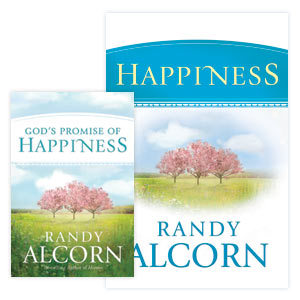 Last month I came out with two books. Happiness is a comprehensive study of what the Bible and God’s people throughout church history have said about happiness, joy, gladness and delight. It’s 444 pages, plus two appendices and lots of endnotes. The second is a small book, God’s Promise of Happiness, 92 pages, which most people could read in an hour.
Last month I came out with two books. Happiness is a comprehensive study of what the Bible and God’s people throughout church history have said about happiness, joy, gladness and delight. It’s 444 pages, plus two appendices and lots of endnotes. The second is a small book, God’s Promise of Happiness, 92 pages, which most people could read in an hour.
I’m looking forward to completing a medium-sized devotional called 60 Days of Happiness. And because Heaven for Kids has been well-received, I’d love to write Happiness for Kids.
Why write different sized books on one subject? Because they’re designed to reach different audiences with varying interests and preferences. The big books are for pastors, teachers and serious Bible students who want to dig in and explore the depths of what Scripture and theologians say. They’re not meant for those who want a quick read and prefer small books or devotionals.
Likewise, those who want a thorough treatment of a subject want more than what small books offer. As in The Three Bears, for some the small version is “just right.” But the right fit for Baby Bear or Goldilocks is the wrong fit for Papa or Mama Bear!
 When I wrote Heaven for Kids and Tell Me About Heaven, I drew from my extensive research for the big Heaven book, and added things unique to each of those small books. I wrote 50 Days of Heaven by selecting the material most suitable for a devotional, then rewriting it in a different style. Everything You Ever Wanted to Know About Heaven is the Reader’s Digest version of Heaven, written for adults but with simplified wording. In We Shall See God, I took excerpts from Charles Spurgeon’s great sermons on Heaven, and supplemented them with my own meditations.
When I wrote Heaven for Kids and Tell Me About Heaven, I drew from my extensive research for the big Heaven book, and added things unique to each of those small books. I wrote 50 Days of Heaven by selecting the material most suitable for a devotional, then rewriting it in a different style. Everything You Ever Wanted to Know About Heaven is the Reader’s Digest version of Heaven, written for adults but with simplified wording. In We Shall See God, I took excerpts from Charles Spurgeon’s great sermons on Heaven, and supplemented them with my own meditations.
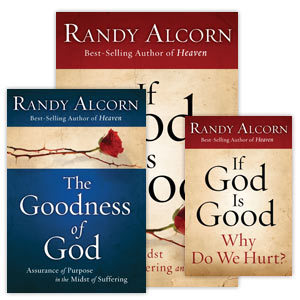 Similarly, after writing the comprehensive If God Is Good, I composed a booklet of the same name, a small book called The Goodness of God and a medium-sized devotional 90 Days of God’s Goodness.
Similarly, after writing the comprehensive If God Is Good, I composed a booklet of the same name, a small book called The Goodness of God and a medium-sized devotional 90 Days of God’s Goodness.
My small books greatly benefit from the extensive research done for my big books. Those who read the small and medium books profit from the years of work I invest in the big ones, even if they never read them. The smaller books allow me to focus not on researching new material, but on shaping what I’ve already discovered to fit the audience I’m trying to reach.
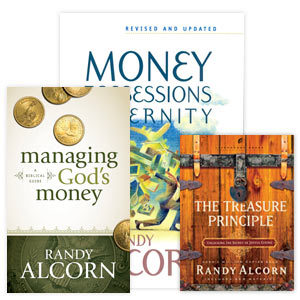 Those who prefer the big books enjoy passing on smaller ones to their believing and unbelieving friends. For instance, those who appreciate my extensive Money, Possessions and Eternity often give their friends my medium-sized Managing God’s Money or my small book on giving, The Treasure Principle, or The Law of Rewards. Money, Possessions and Eternity has reached a wide audience and, by God’s grace, had a life-shaping effect on the four founders of the world-impacting ministry Generous Giving (see www.generousgiving.org). While the big book uniquely influenced them, they’ve passed along not only it, but countless copies of the smaller books.
Those who prefer the big books enjoy passing on smaller ones to their believing and unbelieving friends. For instance, those who appreciate my extensive Money, Possessions and Eternity often give their friends my medium-sized Managing God’s Money or my small book on giving, The Treasure Principle, or The Law of Rewards. Money, Possessions and Eternity has reached a wide audience and, by God’s grace, had a life-shaping effect on the four founders of the world-impacting ministry Generous Giving (see www.generousgiving.org). While the big book uniquely influenced them, they’ve passed along not only it, but countless copies of the smaller books.
The Heaven and If God Is Good booklets have been used extensively to share the gospel. The Heaven booklet has sold as many copies as the Heaven book, each over a million. The booklet’s been handed out at countless funerals and memorial services. I’m praying my mini-book God’s Promise of Happiness might have similar impact. It uses the universal human longing for happiness as a bridge to the “good news of happiness” (Isaiah 52:7) in Jesus.
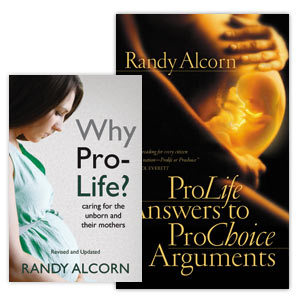 My first book Christians in the Wake of the Sexual Revolution, written in 1985, ultimately gave birth to my booklet Sexual Temptation and my little book The Purity Principle. My big book ProLife Answers to ProChoice Arguments helped shape my little books Why ProLife? and Does the Birth Control Pill Cause Abortions?
My first book Christians in the Wake of the Sexual Revolution, written in 1985, ultimately gave birth to my booklet Sexual Temptation and my little book The Purity Principle. My big book ProLife Answers to ProChoice Arguments helped shape my little books Why ProLife? and Does the Birth Control Pill Cause Abortions?
Surprisingly, my big books have consistently outsold the medium ones, and most of the small ones too. The two dramatic exceptions are The Treasure Principle, with two million sold, and the Heaven booklet. While I write 2-3 small nonfiction books for every large one, it’s hard to measure their relative impact—the answer is always that some people benefit most from the big books, others from the small, and still others the medium-sized.
My big books have had the most impact on pastors, many of whom have based sermon series on them, thus influencing their churches. A pastor who’s been taught that happiness and joy are at odds, and we shouldn’t seek to be happy only holy, will need strong biblical, linguistic and historical evidence to change his thinking—that’s what I offer in the big book. Though the small book summarizes that evidence, and will be sufficient for some casual readers, serious students will need more. While some people will tune out discussions of the meaning of Scripture’s Hebrew and Greek words, others won’t be convinced unless those words are addressed.
In my experience, lay people—and Christian publishers—underestimate their ability to grapple with and understand theological and historical material. We can say no to the superficial “I don’t have time to think” mentality of modern culture. I’ve received many letters from people who’ve never been to college but have read, understood and benefited from my big books.
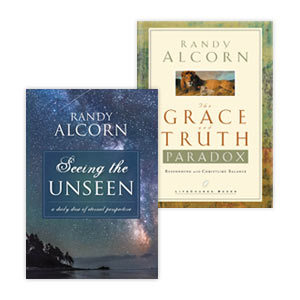 I delight in addressing a variety of subjects, and writing different lengths and types of books. Two of my favorites are the little books The Grace and Truth Paradox and the devotional Seeing the Unseen, which is published by our ministry (as is Help for Women Under Stress).
I delight in addressing a variety of subjects, and writing different lengths and types of books. Two of my favorites are the little books The Grace and Truth Paradox and the devotional Seeing the Unseen, which is published by our ministry (as is Help for Women Under Stress).
Sometimes people criticize small books because “the author didn’t say anything about….” But there’s a lot of information small books can’t possibly include! Similarly, people criticize a large book because it deals in detail with theological issues that don’t interest them. But it’s not written for them. It’s for those who want a thorough treatment they can’t get elsewhere.
We shouldn’t criticize big books for not being a quick or easy read any more than we’d criticize a small book for not being comprehensive or a devotional book for not being scholarly. Usually they aren’t intended to be those things. They serve a different purpose.
That’s exactly why I write books that are big, medium and small, some more comprehensive, others more devotional, some for children, some for comic-lovers, some for those who enjoy murder mysteries. Not all people are alike, so not all books should be. It’s my joy and privilege to write different books on different subjects for different people, meeting different needs.
Paul said, “I have become all things to all people so that by all possible means I might save some” (1 Corinthians 9:22). What’s true in reaching people with the gospel is also true in teaching them God’s truth. Some want quick reads, with the cookies on the lower shelf. Others benefit more from reaching up to the counter and even the cupboard to get not only the cookies, but a lot more. Neither desire is wrong.
When it comes to books, “One size [or kind] does not fit all.” Different people from a variety of backgrounds, at different ages and stages of their lives, are changed by different sorts and sizes of books. My life has been shaped by all kinds of writings that have pointed me to God’s Book. I love writing different books to reach more people in more ways, by God’s grace, with the life-changing truths of His Word.
November 20, 2015
An Opportunity to Help Bring the Gospel to Southeast Asians This Christmas

Some dear friends of our ministry recently made us aware of a great opportunity to help bring the good news of Jesus to those who’ve never heard of him before, through helping to fund the printing of an evangelistic booklet that will be used in Southeast Asia. They are seeking to raise $25,000 by November 24 to print 150,000 copies in time for Christmas. I can’t think of a better way for you and your family to invest in eternity this holiday season! My thanks to EPM staff member Karen Coleman for putting together the information below. —Randy Alcorn
Imagine a large extended family living in a tiny apartment in the steamy capital of a Southeast Asian country. They are eking out a living, but barely. The patriarch of the family trudges habitually and dutifully to the local temple to worship, leaving flowers or food. And each time, he returns home, unchanged.
December 25 will pass as any other ordinary day for this family and countless others, since they know nothing of the Savior whose birth Christians joyfully celebrate. Many even think the religion of Christianity began in the United States.
Now imagine if before Christmas this year, a small booklet called “The Ancient Path” was given to that same elderly patriarch. He curiously reads it and then shares it with the rest of his family. It tells the story of a Path older than the way of Buddha or Confucius, a Way that is Truth and Life. It’s written in their heart language, in words they can understand. The Truth starts sinking in to their hearts and minds, the miracle of salvation takes place, and the angels of Heaven rejoice!
“The Ancient Path” was written by a missionary to Southeast Asia in 2002. Ninety thousand copies were printed in the country where it was first written, and since then it’s also been translated into four other Southeast Asian languages. (Randy personally knows the missionary and his wife and endorses both their ministry and this booklet.)
Please take three minutes to watch this video that shows how “The Ancient Path” is effectively explaining the faith of the Bible, and how it’s being passed from hand to hand in mountain villages and densely populated Asian cities.
The demand has gone beyond the resources of these missionaries—for example, in one country where Christianity is suppressed and even prohibited, local leaders want to put “The Ancient Path” in the hands of every visitor who attends church-sponsored Christmas outreach events.
We at EPM would like to encourage you to support the immediate need of those church leaders in Asia for 150,000 more copies of “The Ancient Path” to be printed in time for Christmas. Funds for printing the booklets are needed by November 24 in order to print and distribute prior to Christmas. So if you feel God’s prompting to give through their GoFundMe campaign, please do it now.
Imagine meeting that same Asian family in Heaven, and knowing you had a small part in helping them find the Ancient Path—Jesus Christ.
photo credit: Hà Nội, 5/2014 via photopin (license)
November 18, 2015
Reflections after the Paris Attacks: The Brevity of Life, God’s Sovereignty, and Our Solid Hope

Like all of you, I was greatly saddened to hear of the attacks in Paris last Saturday. Nanci’s and my prayers have been with the people of France. Many have wept for their pain and suffering. But we’ve also wept because we know this: it could happen to us. Next time it could be me or my family. There is nothing I can do to guarantee it won’t be. (Because our loving God is in control, this is not fatalism.)
“No man has power over the wind to contain it; so no one has power over the day of his death” (Ecclesiastes 8:8). It is presumptuous to think otherwise. We often live under the illusion that our lives are in our hands. But God’s Word warns us otherwise:
“Now listen, you who say, ‘Today or tomorrow we will go to this or that city, spend a year there, carry on business and make money.’ Why, you do not even know what will happen tomorrow. What is your life? You are a mist that appears for a little while and then vanishes. Instead, you ought to say, ‘If it is the Lord’s will, we will live and do this or that.’ As it is, you boast and brag. All such boasting is evil” (James 4:13-16).
Our life on Earth is brief—“All men are like grass, and all their glory is like the flowers of the field; the grass withers and the flowers fall, but the word of our God stands forever” (Isaiah 40:6-8). Understanding this is the key to being wise rather than foolish. In the oldest psalm, Moses prayed, “Teach us to number our days aright, that we may gain a heart of wisdom” (Psalm 90:12).
It might seem that acknowledging we aren’t in control would raise our level of fear. But that’s not true. Recognizing God’s in control should allow us to relax, resting in His sovereignty. A spirit of fear and timidity is not from God (2 Timothy 1:7).
Because God loves us, we can trust that His sovereign will for us is in our best interests. Where God wants us is the very best place to be, the only safe place. As Corrie ten Boom reminds us, “There are no 'if's' in God's world. And no places that are safer than other places. The center of His will is our only safety—let us pray that we may always know it!”
In a time of dark suffering and dread, David affirmed,
The LORD is my light and my salvation—whom shall I fear? The LORD is the stronghold of my life—of whom shall I be afraid?... Though an army besiege me, my heart will not fear; though war break out against me, even then will I be confident.... Though my father and mother forsake me, the LORD will receive me.... I will see the goodness of the LORD in the land of the living. Wait for the LORD; be strong and take heart and wait for the LORD. (Psalm 27:1, 3, 10, 13–14)
The hope of God’s people’s shouldn't be the illusion that we won’t suffer. Our hope should be in Jesus Christ, and that one day God will end our suffering (Revelation 21:4). Our hope should be in the fact that nothing in this world or outside it—no tragedies or accidents or terrorist attacks or anything else—shall separate us from the love of God in Christ Jesus (Romans 8:38-39).
To many of us, “hope” sounds wishful and tentative, but biblical hope means to anticipate with trust. We expect a sure thing, purchased on the Cross, accomplished and promised by an all-knowing God.
Hope points to the light at the end of life’s tunnel. It not only makes the tunnel endurable, it fills the heart with anticipation of a world alive, fresh, beautiful, without pain, suffering, terrorists or war. A world ruled by the only One worthy of ruling (see Revelation 5:12). Though we don’t know exactly when, we do know for sure that either by our deaths or by Christ’s return, our suffering will end. From before the beginning, God drew the line in eternity’s sand to say for his children, “This much and no more, then endless joy.”
In Tolkien’s Return of the King, Aragorn says, “Dawn is ever the hope of men.” King David wrote, “Weeping may last for the night, but a shout of joy comes in the morning” (Psalm 30:5, NASB).
The night may seem long for God’s people, but the truth is this: once it comes, the morning will never end.
Neither will the joy.
Photo credit: Bianca Dagheti via Flickr / Creative Commons
November 16, 2015
The Joy of Forgiveness
I’ve seen families, friends, neighbors and churches torn apart by refusal to forgive. If we believed in the joy-giving power of forgiveness, it would transform our perspectives and help us live happier, more God-honoring lives.
Everyone could call up a catalogue of grievances done to them by their children, parents, friends, spouse, employers, neighbors, the DMV, the phone company. Some wrongs are real and serious, others are imaginary or exaggerated, but all sabotage happiness unless there’s true forgiveness demonstrated by refusal to rehearse them. Lewis Smedes writes, “To forgive is to set a prisoner free and discover that the prisoner was you.”
This reminds me of Corrie ten Boom's story. I heard her talk once of meeting a sadistically cruel guard from the death camp Ravensbrück, where she'd been a prisoner. As you read her account of this meeting, recorded in her book Tramp for the Lord, marvel at the Messiah's grace, and His empowerment to His people to extend that grace to others:
It was in a church in Munich that I saw him—a balding, heavyset man in a gray overcoat, a brown felt hat clutched between his hands. People were filing out of the basement room where I had just spoken, moving along the rows of wooden chairs to the door at the rear.
It was 1947 and I had come from Holland to defeated Germany with the message that God forgives.
It was the truth they needed most to hear in that bitter, bombed-out land, and I gave them my favorite mental picture. Maybe because the sea is never far from a Hollander’s mind, I liked to think that that’s where forgiven sins were thrown. “When we confess our sins,” I said, “God casts them into the deepest ocean, gone forever…”
The solemn faces stared back at me, not quite daring to believe. There were never questions after a talk in Germany in 1947.
People stood up in silence, in silence collected their wraps, in silence left the room.
And that’s when I saw him, working his way forward against the others. One moment I saw the overcoat and the brown hat; the next, a blue uniform and a visored cap with its skull and crossbones. It came back with a rush: the huge room with its harsh overhead lights; the pathetic pile of dresses and shoes in the center of the floor; the shame of walking naked past this man. I could see my sister’s frail form ahead of me, ribs sharp beneath the parchment skin. Betsie, how thin you were!
Now he was in front of me, hand thrust out: "A fine message, Fräulein! How good it is to know that, as you say, all our sins are at the bottom of the sea!"
And I, who had spoken so glibly of forgiveness, fumbled in my pocketbook rather than take that hand. He would not remember me, of course—how could he remember one prisoner among those thousands of women?
But I remembered him and the leather crop swinging from his belt. I was face-to-face with one of my captors and my blood seemed to freeze.
“You mentioned Ravensbrück in your talk,” he was saying, “I was a guard there.” No, he did not remember me.
“But since that time,” he went on, “I have become a Christian. I know that God has forgiven me for the cruel things I did there, but I would like to hear it from your lips as well. Fräulein,”—again the hand came out—“will you forgive me?”
And I stood there—I whose sins had again and again to be forgiven—and could not forgive. Betsie had died in that place—could he erase her slow terrible death simply for the asking?
It could not have been many seconds that he stood there—hand held out—but to me it seemed hours as I wrestled with the most difficult thing I had ever had to do.
For I had to do it—I knew that. The message that God forgives has a prior condition: that we forgive those who have injured us.
“If you do not forgive men their trespasses,” Jesus says, “neither will your Father in heaven forgive your trespasses.”
I knew it not only as a commandment of God, but as a daily experience. Since the end of the war I had had a home in Holland for victims of Nazi brutality. Those who were able to forgive their former enemies were able also to return to the outside world and rebuild their lives, no matter what the physical scars. Those who nursed their bitterness remained invalids. It was as simple and as horrible as that.
And still I stood there with the coldness clutching my heart. But forgiveness is not an emotion—I knew that too.
Forgiveness is an act of the will, and the will can function regardless of the temperature of the heart.
“… Help!” I prayed silently. “I can lift my hand. I can do that much. You supply the feeling.”
And so woodenly, mechanically, I thrust my hand into the one stretched out to me. And as I did, an incredible thing took place. The current started in my shoulder, raced down my arm, sprang into our joined hands. And then this healing warmth seemed to flood my whole being, bringing tears to my eyes.
“I forgive you, brother!” I cried. “With all my heart!”
For a long moment we grasped each other’s hands, the former guard and the former prisoner. I had never known God’s love so intensely, as I did then…
But even so, I realized it was not my love. I tried and did not have the power. It was the power of the Holy Spirit as recorded in Romans 5:5… “because the love of God is shed abroad in our hearts by the Holy Ghost which is given to us.”



